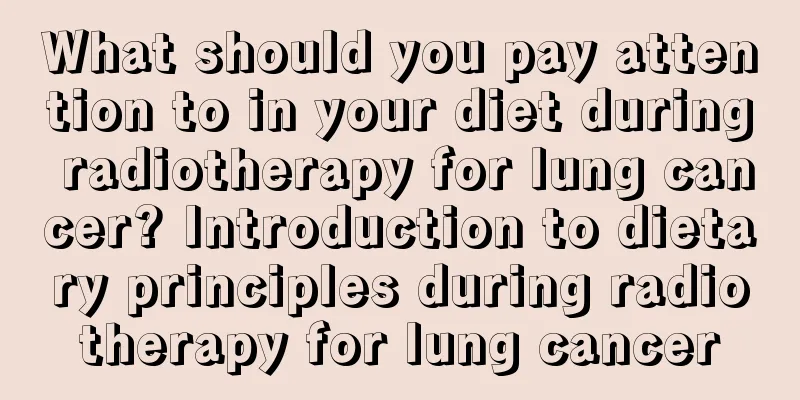What should you pay attention to in your diet during radiotherapy for lung cancer? Introduction to dietary principles during radiotherapy for lung cancer

|
Experts say that lung cancer patients are in great pain during chemotherapy, and experience symptoms such as nausea, vomiting, and loss of appetite. At this time, as the patient's family, you must do a good job of caring for the patient, especially paying special attention to the diet, which is helpful to improve the patient's immune ability. So what should lung cancer patients pay attention to in their diet during radiotherapy? Radiotherapy patients often experience varying degrees of systemic reactions, digestive tract reactions, and bone marrow suppression reactions during treatment. If combined with appropriate nutritional therapy, it can not only ensure the smooth progress of radiotherapy, but also improve the efficacy of radiotherapy and reduce the side effects of radiotherapy. Therefore, nutritional therapy is an important measure to maintain the physical strength and anti-cancer ability of radiotherapy patients and improve the efficacy. In radiotherapy for lung cancer, the rays are irradiated on the surface of the body close to the tumor. Radioactive rays do not have intelligent recognition capabilities and cannot distinguish and kill cancer cells from normal cells. Therefore, it will also have an impact on the normal tissues of the human body, easily causing local and systemic radiation reactions and damage. Therefore, after the clinical diagnosis of radiotherapy, we should seize the time to supplement the body with nutrition to improve physical fitness, enhance resistance, and prevent or delay the occurrence of cachexia. The side effects of radiotherapy for lung cancer are more obvious. If used blindly, it is easy to cause serious consequences, such as mucosal damage, bone marrow suppression, leukopenia, etc. Among them, the side effects related to malnutrition are: Radiotherapy to the head and neck can damage taste cells, causing a decrease or disappearance of the sense of taste and resulting in loss of appetite. After radiotherapy to the oral cavity, esophagus, gastrointestinal tract and other parts, the mucosa becomes congested and edematous, followed by erosion, resulting in difficulty swallowing, nausea and vomiting, diarrhea, bloody stools, and a few lung cancers may develop digestive tract perforation. At the same time, it can inhibit the secretion of gastric acid and various proteases, reduce gastrointestinal digestive function, and may not cause the loss of electrolytes, etc. For radiotherapy patients who are able to eat, food should be selected according to their physical condition, nutritional status, weather, and living habits. According to traditional Chinese medicine, radiation is a heat poison, and patients often experience symptoms such as dry mouth, sore throat, nausea, anorexia, dry nasopharynx, and yellow and oliguric urine during treatment. Especially for malignant tumors of the head and neck, the reaction caused by radiotherapy is relatively severe, and it can also cause radiation inflammation in the mouth, throat, esophagus, etc. Therefore, the diet should be adjusted according to different clinical symptoms. Due to the serious reaction of radiotherapy, many people have poor appetite, swallowing pain, and oral ulcers. Therefore, they should eat semi-liquid or soft food, such as nutritious and easily digestible porridge, noodle soup, wonton, etc. Cooking should be delicate, and pay attention to the processing of color, fragrance, and taste. The food should not be too hot. Meat can be chopped into small pieces or stewed. If vegetables and fruits cannot be swallowed, they can be squeezed into juice and drunk. In addition, do not eat dog meat, mutton, yellow croaker, hairtail, crab, orange, longan and other hot foods. Also, be careful not to eat spicy food. If fever symptoms occur during radiotherapy, you can eat pears, watermelons, water chestnuts, turtles, duck eggs, duck meat and other heat-clearing and detoxifying foods to relieve symptoms. In short, the diet should be light and delicious, and contain high vitamin and high protein nutrition. Eat more fruits and vegetables, supplement multivitamins, drink more milk and yogurt. In order to supplement the body's protein needs, you should also drink more broth and fish soup, especially boiled turtle soup, which can nourish yin and blood and stimulate bone marrow hematopoiesis, which is very suitable for radiotherapy patients. The above introduces the dietary considerations for lung cancer patients during chemotherapy. Experts say that during chemotherapy, lung cancer patients should eat more high-egg foods. In addition, they can also eat some medicated foods, which are very helpful for the auxiliary treatment of lung cancer. If you want to know more about lung cancer, you can consult an expert online. |
<<: How to treat advanced lung cancer? The best treatment for advanced lung cancer
>>: How to detect liver cancer early? Six differential diagnosis methods for liver cancer
Recommend
What medicine is better for moderate fatty liver and what should I pay attention to
Moderate fatty liver disease is very common in li...
What medicine is good to take after liver cancer surgery?
After liver cancer surgery, sorafenib targeted th...
Is there hope for a cure for stage III small cell lung cancer?
Is there hope for a cure for stage III small cell...
The harm of expired diapers
Expired diapers should no longer be used by child...
How does black light treat shingles?
Black light therapy is also known as ultraviolet ...
What are the best ways to treat lateral epicondylitis of the humerus
Lateral epicondylitis is a disease that worsens w...
What aspects does postoperative care for nasopharyngeal carcinoma include?
There are many patients with nasopharyngeal carci...
What are the dangers of melanoma
The early symptoms of melanoma are not very obvio...
What is a good treatment for sore throat caused by laryngeal cancer
Sore throat is a typical symptom of laryngeal can...
How to treat bronchial asthma?
Bronchitis was called asthma in ancient times. It...
What to do with the red spots caused by mosquito bites
Many of our friends are very annoyed by mosquito ...
Can soap be used to wash your face? What are the benefits?
Many people have used soap to wash their faces, b...
Will children be infected if they come into contact with lung cancer patients?
Will children be infected if they come into conta...
Do I need to remove my makeup during lunch break
For many women, they need to wear makeup every da...
How to wash white clothes that turn yellow?
Many people like to wear white clothes. White clo...









